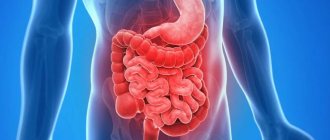About caffeine
One two hundred forty milliliter cup of coffee contains approximately 95 mg of caffeine. Although the substance is a powerful mental stimulant, research shows that it can increase the frequency of contractions throughout your digestive tract.
A study conducted at the end of the last century showed that drinks with caffeine stimulate the colon twenty-three percent more than drinks without this component. Accordingly, coffee consumption entails an increase in the intensity of the lower intestine.
Additionally, some research suggests that caffeine may increase stomach acid production, which may also have a negative impact on your gastrointestinal tract. The negative consequences are especially noticeable if the intestines are highly sensitive.
What can you replace coffee with?
What can you drink if you have gastritis instead of a regular drink? Each person is individual, so only the person himself can accurately determine the drink.
For example, there are options such as cocoa or coffee substitutes made from barley or chicory.
If a person cannot give up coffee, a small test should be done. To do this, after a person has eaten, he needs to drink weak coffee.
The body's reaction determines whether a person will be able to take it in small quantities or not. If a person’s health deteriorates, it is necessary to completely stop using it.
Replacing coffee with chicory
Chicory is a plant-based powder. It has a positive effect on the digestive system, gently enveloping the mucous membranes of the stomach, protecting them from the negative effects of hydrochloric acid, promoting the restoration of the organ at the structural level.
Chicory will be especially useful for gastritis with low acidity, as it stimulates the production of gastric juice, saturates the body with vitamins, macro- and microelements that are beneficial for it.
Another drink - Cocoa
Cocoa is another delicious coffee substitute. It is recommended to drink for gastritis with high acidity. Cocoa powder contains saccharides and starch, which promote the secretion of gastric juice. The beneficial properties of cocoa for the digestive system and body are explained by its components:
- Endorphin is a hormonal substance called the hormone of happiness; it improves mood and evens out the psycho-emotional background. Feeling good and having a positive attitude will speed up the healing process;
Nutritional additives in cocoa beans have an effect similar to aspirin. These substances stop the platelet adhesion process, improving blood quality.
- Cocokhil is a special substance that activates the process of cell division and growth, accelerating the healing of damaged mucous membranes.
Barley coffee
Barley coffee is another drink substitute. Connoisseurs of invigorating liquid will like it; it tastes like cappuccino. The drink has a general strengthening effect and increases the body's resistance to stress. Barley coffee is especially beneficial for the stomach, as it creates a favorable environment for the development of beneficial microflora.
Barley drink has no negative properties. To get maximum benefit, it is better to boil it in milk.
Caffeic acids
While caffeine is often thought to be the reason why coffee can cause stomach problems, research has shown that caffeic acids may also play a role.
Good company for leggings: blazer and other good solutions
Thanks to Chip: the cat was reunited with his family 10 years later
After the story of the ban on leaving the country, Pavel Derevyanko managed to fly away on vacation
Coffee contains many acids, such as chlorogenic acid and N-alkanoyl-5-hydroxytryptamide, which help increase stomach acid production. It helps break down food so it can move through the intestines.
Chlorogenic acid not only has disadvantages, but also has a number of significant advantages. It activates the breakdown of fats and improves metabolism. In addition, the substance has antioxidant properties, prevents mutagenic activity and reduces the risk of cancer. Chlorogenic acid increases the elasticity of vessel walls, improves the condition of the skin and normalizes blood sugar levels. The substance has an antimicrobial and anti-inflammatory effect, and also has a positive effect on the skin and muscle tissue.
Although some have suggested that coffee may worsen heartburn symptoms, no significant scientific link has been proven between stomach discomfort and coffee.
The effect of coffee on the intestines and stomach
In recent years, coffee has received widespread publicity for its role in protecting the brain from degenerative diseases. We know that coffee is rich in antioxidants, vitamins, minerals, amino acids, plant compounds, fats and carbohydrates. In small quantities, coffee can actually be beneficial for most healthy people. The main disadvantage of coffee is that it is very acidic, and this acidity can have consequences on the intestines. Before you drink your next cup of java, weekend latte, or morning cup of joe, here are five facts you need to know about the effects of coffee on your gut and stomach.
Increased stomach acidity
Do you regularly drink a lot of coffee in the morning? Gut problems may be just around the corner. It's not just caffeine, so drinking decaffeinated coffee won't help avoid the danger. Caffeine and other plant compounds stimulate stomach cells to release more hydrochloric acid, which can sometimes aid digestion. But drinking coffee regularly, especially in the morning on an empty stomach, reduces the amount of stomach acid available for subsequent digestion.
Do you regularly drink a lot of coffee in the morning? Gut problems may be around the corner
H. pylori, the main bacteria that causes ulcers, prefers a highly acidic environment. Add to this the way coffee weakens the stomach's protective barrier - the lining - and the risk of damage and ulcers increases.
Stimulates acid reflux
Drink enough coffee and you may experience acid reflux or heartburn. Coffee relaxes the esophageal sphincter, the closing muscle valve that allows food into the stomach and ensures it stays there. Acid leaking from the stomach irritates the tissues of the esophagus. If this happens often enough, complications such as ulcers, ulcers, or permanent changes to the cells of the esophagus can occur.
Exacerbates IBS and other intestinal diseases
Coffee increases symptoms of bowel diseases such as gastritis, irritable bowel disorder, colitis and Crohn's disease. Certain enzymes in coffee trigger an immune response that leads to inflammation, bloating, cramping, gas, and diarrhea.
Increases the likelihood of food rotting in the intestines
Coffee is known to encourage the stomach to release its contents into the small intestine before complete digestion occurs. Food that is not completely digested often remains in the intestines and rots. This creates a toxic environment ideal for the proliferation of “bad” bacteria in the gut, damaging the intestinal wall and leading to inflammation and an immune response to the enzymes in coffee.
Overstimulates bowel wave action
Nerve and brain cells depend on a neurochemical called GABA. It is responsible for calming the nerves after triggering. The caffeine in coffee prevents GABA from doing its job, and this can lead to an overactive gut. The most common symptom is cramping or an urge to go to the toilet.
What causes discomfort?
In some cases, the cause of discomfort is not coffee at all. In fact, stomach upset can be caused by additives such as milk, cream, sweeteners or sugar, which more than two-thirds of people add to their drink.
A man found a bottle with a diamond ring and a letter.
Teeth Whitening Powder: I've been using this simple recipe for years.
How to make a spectacular house for your beloved cat from wooden boards
For example, the bodies of approximately sixty-five percent of people worldwide cannot properly digest lactose, a sugar in milk that can cause symptoms such as bloating, stomach cramps, or diarrhea soon after consuming dairy products.
Can decaffeinated coffee negatively affect the digestive system?
In some cases, switching to decaffeinated coffee may help with an upset stomach. However, this drink contains caffeic acids such as chlorogenic acid and N-alkanoyl-5-hydroxytryptamide, which are associated with increased stomach acid production and intestinal contractions.
Additionally, adding milk, cream, sugar, or sweeteners to decaf coffee may cause stomach problems in people who are sensitive to these additives.
When is it safe to drink coffee?
It is recommended to drink liquid some time after a meal. If you drink it immediately after a meal, it interferes with the process of breakdown and absorption of food and disrupts the functioning of the intestines. It is better to wait 60 minutes after a meal, since then the acids will act on the food without interfering with digestion.
It is best to drink coffee 15-20 minutes after eating
The interval between meals and drinking coffee should not be less than 15-20 minutes.
If you look at the body’s biorhythms and its needs for an additional boost of energy, the best times for consumption are the following hours: from 10 to 11, from 12 to 13.30, from 17.30 to 18.30.
How to avoid stomach upset
If you find that coffee upsets your stomach, it is important to take immediate steps to reduce the effects of the drink.
For delicate skin, I make a bubble bath with vitamins myself: I’m sharing the recipe
A new strain of coronavirus, identified in December in South Africa, was discovered in Germany
The building is unrecognizable. The girl decided to renovate the house of her youth (photo)
First, drink your coffee slowly and in small sips to soften the effect of the drink on your gastrointestinal tract. Also, try not to drink coffee on an empty stomach. The drink is considered sour, so drinking it with food can ease digestion.
A few more ways to minimize the acidity of coffee
There are several effective ways to reduce the negative impact of the drink on the stomach.
- If you like coffee, buy dark beans that have been roasted longer and at higher temperatures. Dark roast beans tend to be less acidic. Finding out more about grains is quite simple. Contact a consultant in the store, and he will definitely tell you information about coffee beans and help you choose exactly the ones you need.
- Try iced coffee. Research shows that cold brew is less sour.
- Choose a coarser grind. One study found that using fewer coffee grounds may allow more acid to be released during brewing. This means that coffee made with a coarser grind may be less acidic. Also, if you enjoy a cup of milk with milk but are lactose intolerant or feel that milk is hard on your stomach, try using a plant-based dairy alternative such as soy or almond milk.
It is better to avoid using freeze-dried coffee if you have problems with the gastrointestinal tract. It contains tannins, which irritate the walls of the stomach and can cause problems with the liver and gastrointestinal tract. In addition, freeze-dried coffee does not bring any benefit to the body. Powder analogues should also be abandoned. If you are concerned about your health, give preference to a drink made from roasted grains.
If you find that coffee is bad for your stomach, try some of the tips above. In many cases, reducing the acidity of coffee or eliminating additives can help combat gastrointestinal problems caused by drinking the drink.
Coffee for gastritis
Roasted coffee (this is what we consume) contains caffeine and chlorogenic acid, which causes its bitter taste and aroma, as well as acids formed from fiber and fats of green beans as a result of their heat treatment. It is they who are aggressive towards the inner wall of the stomach, provoking excessive release of hydrochloric acid and increased inflammation of the gastric epithelium.
In addition, coffee irritates the intestines. Among the effects of drinking a drink on an empty stomach, after half an hour, depending on the characteristics of the body, the occurrence of flatulence, the urge to visit the toilet, abdominal pain, and diarrhea are observed.
We recommend reading: Is it possible to have coffee for gastritis?
Coffee for gastritis is strictly prohibited for atrophic, erosive forms and ulcers. In case of remission for any form of gastritis, if you cannot refuse the drink, dilute it with water, cool it to room temperature, choose pure coffee without additives.











